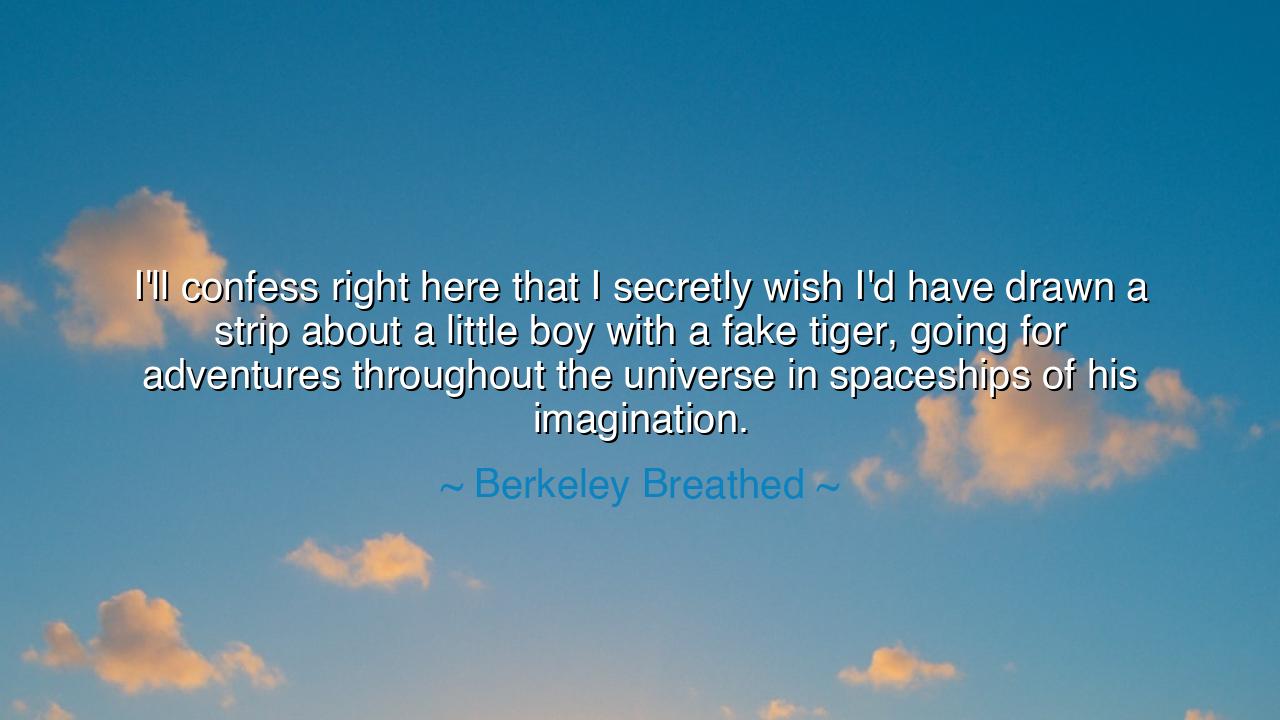
I'll confess right here that I secretly wish I'd have drawn a
I'll confess right here that I secretly wish I'd have drawn a strip about a little boy with a fake tiger, going for adventures throughout the universe in spaceships of his imagination.






“I’ll confess right here that I secretly wish I’d have drawn a strip about a little boy with a fake tiger, going for adventures throughout the universe in spaceships of his imagination.” — thus spoke Berkeley Breathed, the brilliant creator of Bloom County, in a moment of wistful admiration and humility. These words are not merely an artist’s compliment to another, but a reflection on the sacred fire of imagination — that divine gift which allows mortals to turn the ordinary into the infinite. The “little boy with a fake tiger” he speaks of is none other than Calvin and Hobbes, the creation of Bill Watterson, whose comic strip captured the boundless wonder of youth and the ceaseless flight of the human spirit.
In Breathed’s confession lies both reverence and revelation. He recognizes that true art does not reside in the cleverness of the pen, but in the imaginative soul that guides it. Calvin, with his cardboard spaceships and cosmic daydreams, is not just a child in ink and paper — he is the living emblem of what it means to see the world as more than it appears. In every snowy hill he sees a battlefield, in every cardboard box, a portal to new worlds. Through imagination, the mundane becomes miraculous. And it is this spirit that Breathed, though an artist himself, wishes he had captured — the eternal flame of wonder that turns simplicity into transcendence.
To the wise, this longing is no envy, but homage. The ancients often said that art is born from the same eternal wellspring, and each artist drinks but a portion. In admiring Watterson’s boy and tiger, Breathed pays tribute to that creative current which runs through all human hearts. It is the same current that made Homer sing of Odysseus, that made Leonardo dream of flight, that made every child turn a stick into a sword. The spaceships of imagination that Calvin pilots are the same vessels in which humankind has always traveled — not through galaxies of stars, but through the infinite expanse of the human mind.
This confession also reminds us of a sacred truth: that imagination is the purest form of freedom. The child who imagines is unbound by circumstance or limitation. His world is vast because his mind is unshackled. But as we grow older, the world teaches us to trade imagination for practicality, wonder for caution, dreams for duties. Yet in this trade, something divine is lost. What Breathed envies is not fame, but purity — the fearless, unfiltered vision of a child who dares to believe that his stuffed tiger is alive, and that every corner of his world hides a new adventure.
Consider the story of Antoine de Saint-Exupéry, who wrote The Little Prince. Like Calvin, the prince journeyed among planets and stars — not in a spaceship of metal, but in one of thought and tenderness. Saint-Exupéry, too, mourned the loss of imagination in adulthood, saying, “All grown-ups were once children, but only few of them remember it.” His tale endures because it speaks to that forgotten truth: that imagination is not a luxury, but the lifeblood of understanding, compassion, and creation. Through imagination, we do not escape reality — we reveal its deeper meaning.
Breathed’s reflection is also a meditation on humility among creators. The truly great artist is one who marvels at another’s work, who recognizes beauty not as competition but as communion. His confession is not of failure, but of admiration — the acknowledgment that art, at its highest, awakens something universal within us. The boy and his tiger live not only in Calvin’s world, but in every artist’s heart — in every dreamer who has ever wished to turn a thought into a world.
And so, the lesson is this: never lose the spaceships of your imagination. Guard them fiercely, for they are the chariots of the soul. Whether you are artist or dreamer, child or elder, let imagination remain your compass. When the world feels small, look inward and let your mind build galaxies. When life feels ordinary, dare to see it as extraordinary. When you create, do so not merely to record the world, but to reimagine it.
For in the end, Breathed’s wish is not just for himself — it is for us all. It is a yearning for the child within us, the one who still believes that a cardboard box can fly, that a tiger can talk, that love and wonder can conquer the universe. May we never abandon that child. May we keep drawing our own adventures, across the infinite page of imagination, and thus repay life with the one gift it first gave us — the power to dream.






AAdministratorAdministrator
Welcome, honored guests. Please leave a comment, we will respond soon